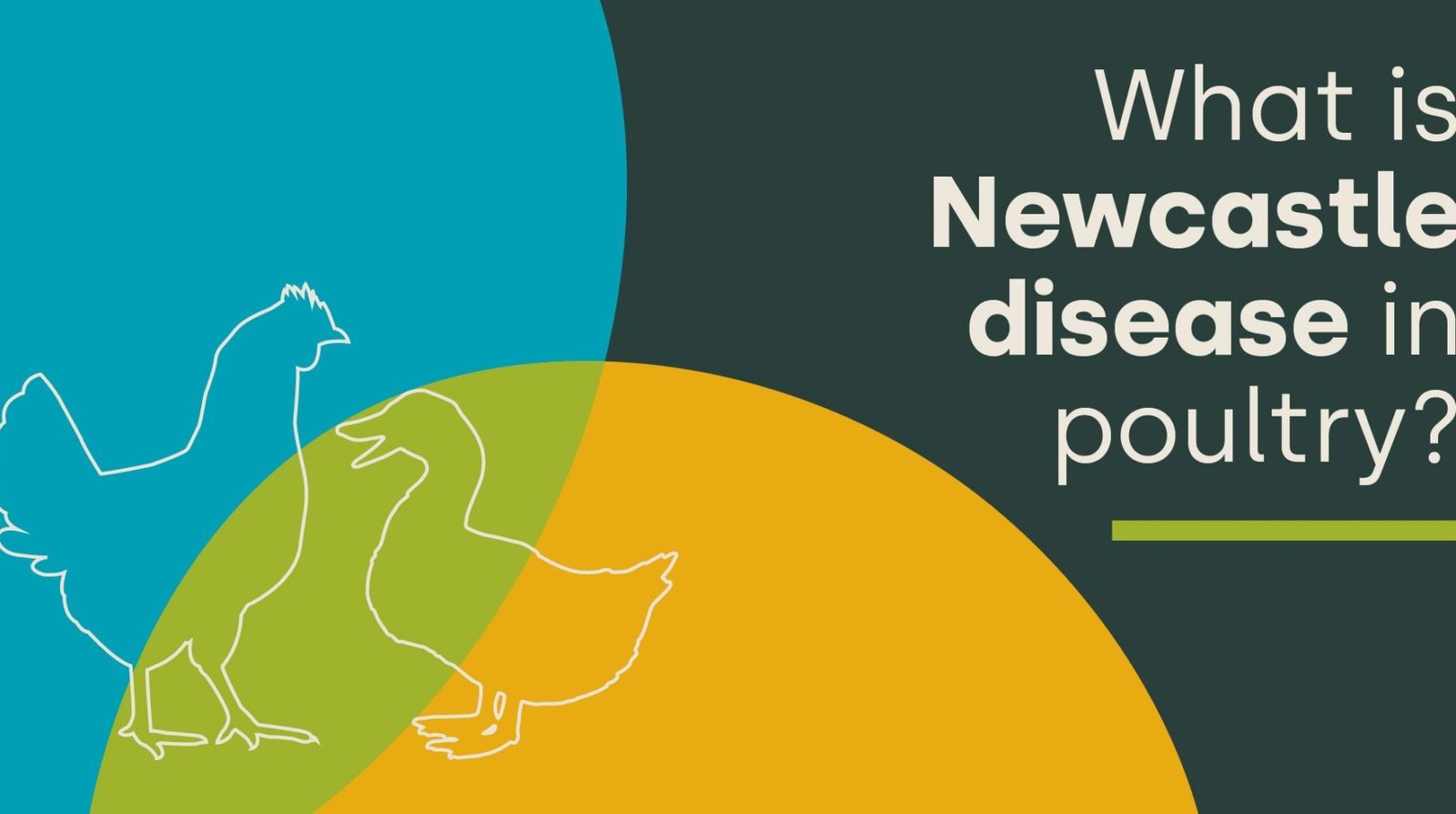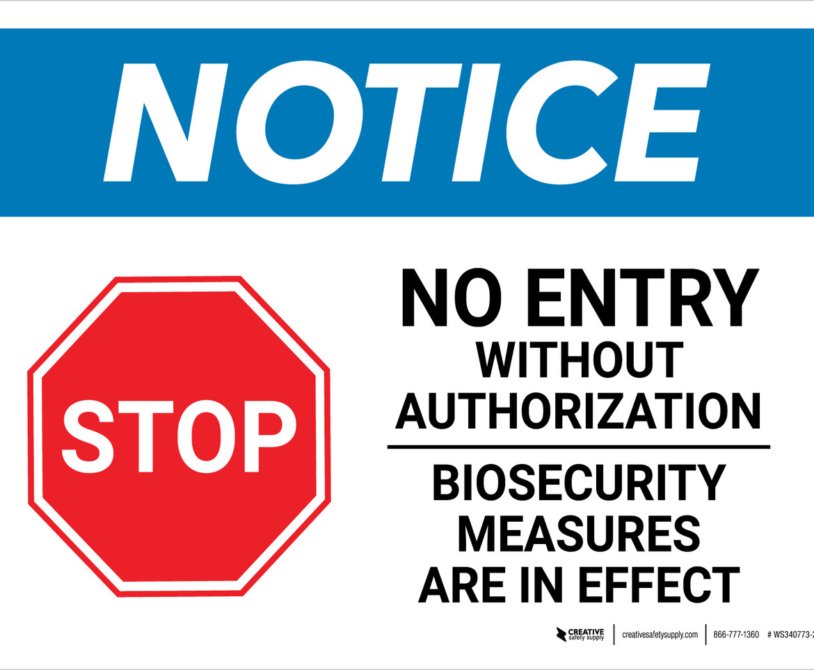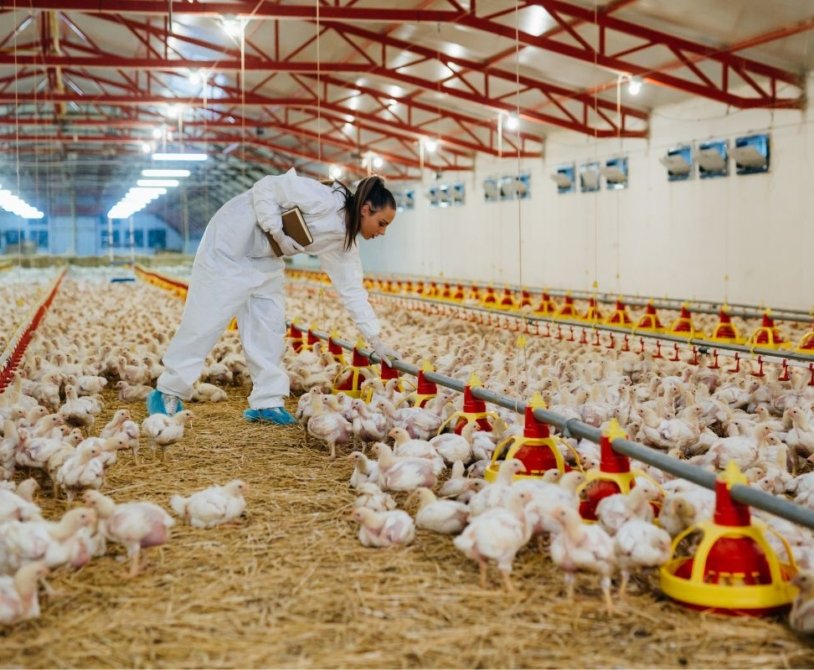Newcastle disease is a highly contagious and potentially devastating viral infection affecting poultry worldwide. It is a leading cause of respiratory illness and mortality in birds. This disease poses a significant threat to the poultry industry, requiring a deep understanding and proactive management strategies.
This article provides a comprehensive overview of Newcastle disease. It covers its symptoms, prevention techniques, and control measures. This information is meant to empower poultry farmers and industry professionals. It helps them maintain the health and productivity of their flocks.
Key Takeaways
- Newcastle disease is a highly contagious viral infection that affects poultry, causing respiratory illness and mortality.
- Understanding the symptoms, transmission, and pathogenesis of the Newcastle disease virus is crucial for effective prevention and control measures.
- Implementing robust biosecurity protocols and vaccination programs are key strategy to mitigate the risk of Newcastle disease outbreaks in commercial poultry operations.
- Timely recognition of the disease, rapid response, and coordinated efforts are essential to contain the spread and minimize the impact on poultry flocks.
- Recognizing the public health implications of Newcastle disease, as a viral zoonosis, is important for safeguarding both animal and human populations.
What is Newcastle Disease?
Newcastle disease is a highly contagious viral infection that mainly affects poultry. It causes big problems for the poultry industry. The virus, known as the Newcastle disease virus, can infect many bird species. This includes chickens, turkeys, ducks, and geese.
Newcastle Disease Virus: An Overview
The Newcastle disease virus has different types and levels of severity. It can cause mild symptoms or severe, life-threatening diseases in birds. These symptoms can affect the respiratory, neurological, and digestive systems.
Poultry Susceptibility and Transmission
- Poultry like chickens and turkeys are very susceptible to the Newcastle disease virus.
- The virus spreads through direct contact with infected birds, contaminated items, or even the air.
- Outbreaks can spread quickly, affecting a whole flock or even different farms in an area.
It’s important to understand how the Newcastle disease virus spreads. This knowledge helps in preventing and controlling outbreaks. It keeps poultry flocks healthy and productive.
| Poultry Species | Susceptibility to Newcastle Disease Virus |
|---|---|
| Chickens | High |
| Turkeys | High |
| Ducks | Moderate |
| Geese | Moderate |
Symptoms of Newcastle Disease
Newcastle disease is a highly contagious viral illness that affects poultry. It shows a range of concerning symptoms. These symptoms indicate how severe the disease is and the need for quick action.
Respiratory distress is a key sign of Newcastle disease. Birds may gasp, cough, sneeze, and make a rattling sound when breathing. This illness can spread fast, harming the health and well-being of many birds.
Newcastle disease also affects the nervous system of poultry. Birds may show tremors, drooping wings, twisted heads and necks, and even paralysis. These symptoms can greatly reduce a bird’s ability to function, affecting productivity and welfare.
A drop in egg production is another symptom of Newcastle disease. Infected hens may lay fewer eggs, which can hurt a farmer’s business. This decline shows the disease’s harmful effects on the flock’s health and well-being.
It’s important to spot and diagnose these symptoms early. This helps control the disease and protect the flock. Knowing the symptoms of Newcastle disease helps poultry producers act fast to keep their flocks safe.
“Prompt recognition and reporting of Newcastle disease symptoms are essential for containing the outbreak and minimizing its impact on poultry production.”
The Newcastle Disease Virus: A Poultry Pathogen
The Newcastle disease virus is a highly contagious and virulent pathogen. It poses a significant threat to the health and productivity of poultry flocks. This virus, classified as a member of the Paramyxoviridae family, is known for its ability to cause severe respiratory and neurological symptoms in infected birds.
It leads to substantial economic losses for poultry producers.
Pathogenesis and Clinical Signs
The Newcastle disease virus primarily targets the respiratory and nervous systems of poultry. It leads to a range of clinical signs that can vary in severity. The virus can cause a wide spectrum of symptoms, from mild respiratory distress to more severe manifestations, such as diarrhea, tremors, and even paralysis.
The pathogenesis of the Newcastle disease virus involves the virus’s ability to replicate rapidly within the host’s cells. This leads to the disruption of vital bodily functions and the triggering of the host’s immune response. This, in turn, can result in tissue damage, inflammation, and the impairment of the bird’s ability to breathe and maintain proper neurological function.
| Clinical Signs of Newcastle Disease | Severity |
|---|---|
| Respiratory distress (coughing, sneezing, gasping) | Mild to severe |
| Diarrhea | Moderate to severe |
| Tremors and paralysis | Severe |
| Decreased egg production | Moderate to severe |
| Sudden death | Severe |
The severity of the clinical signs can be influenced by several factors. These include the strain of the Newcastle disease virus, the bird’s age, and the level of immunity within the flock. Understanding these pathogenic mechanisms and clinical manifestations is crucial for effectively managing and controlling outbreaks of Newcastle disease in poultry operations.
Understanding Newcastle Disease: Symptoms, Prevention, and Control
Newcastle disease is a highly contagious viral infection that threatens poultry health. It’s important to know the symptoms, prevention, and control measures. This knowledge helps poultry producers and enthusiasts protect their flocks.
Recognizing the Symptoms
Early detection of Newcastle disease symptoms is crucial. Common signs include:
- Respiratory distress, such as gasping, coughing, and nasal discharge
- Nervous system disorders, including tremors, drooping wings, and twisting of the head and neck
- Reduced egg production and soft, thin-shelled eggs
- Greenish, watery diarrhea
- Sudden death in severe cases
Recognizing these symptoms early helps poultry producers take action. This can help contain the disease and protect their flocks.
Preventive Strategies
Prevention is key to protecting poultry from Newcastle disease. Effective strategies include:
- Strict biosecurity measures, such as limiting access to poultry facilities, disinfecting equipment, and implementing effective cleaning protocols
- Vaccination programs, which can provide a significant level of protection for poultry flocks
- Proper management of poultry housing, ventilation, and nutrition to support overall flock health
By using these preventive measures, poultry producers can lower the risk of outbreaks. This helps maintain the health and productivity of their flocks.
Controlling the Spread
When Newcastle disease breaks out, quick action is needed to control it. Key steps include:
- Quarantining affected birds and flocks to prevent further transmission
- Culling infected birds to eliminate the source of the virus
- Thorough cleaning and disinfection of poultry facilities to eliminate the virus from the environment
- Strict movement control and biosecurity protocols to limit the spread of the disease to other poultry operations
By taking a comprehensive approach, poultry producers can manage Newcastle disease. This helps protect the health of their flocks.
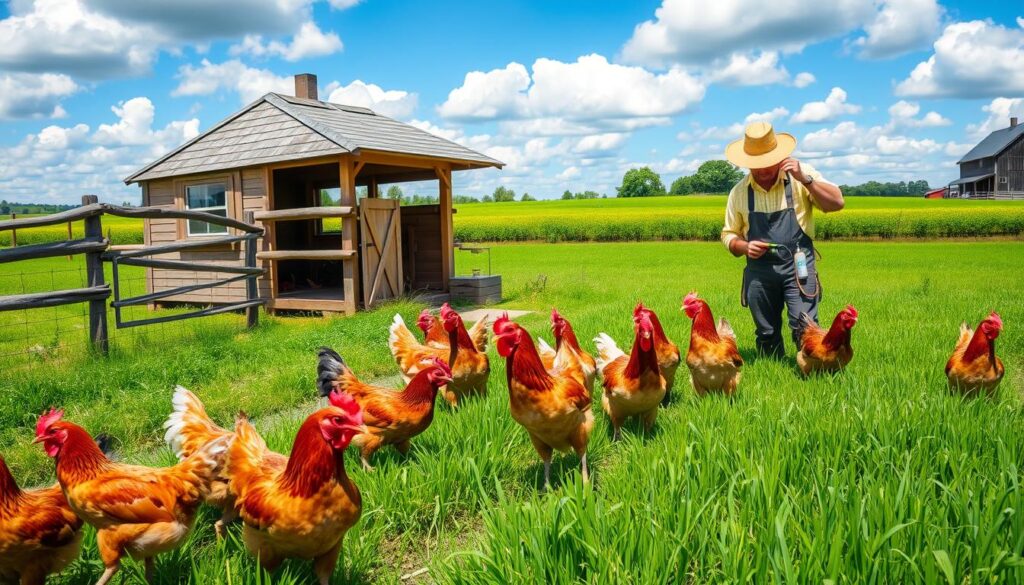
In conclusion, understanding Newcastle disease is vital for poultry health. By being vigilant and implementing best practices, producers can manage this threat. This ensures the health and productivity of their flocks.
Preventing Newcastle Disease Outbreaks
Keeping poultry safe from Newcastle disease is a top priority for farmers and experts. Strong biosecurity measures are key to stopping outbreaks and keeping birds healthy. By using a wide range of disease control methods, farmers can lower the chance of Newcastle disease spreading in their places.
Biosecurity Measures for Poultry Operations
Good biosecurity protocols for poultry operations involve many steps to stop Newcastle disease virus. These steps include:
- Thorough disinfection of all equipment, vehicles, and people coming in
- Limiting who can get into the poultry house, with strict entry and exit points
- Keeping a close eye on birds for any signs of sickness
- Properly getting rid of dead birds and waste to avoid contamination
- Keeping sick or suspicious birds separate
- Regularly cleaning and sanitizing the poultry house
By following these biosecurity measures, farmers can greatly lower the risk of Newcastle disease outbreaks. This helps keep their birds healthy and productive.
“Effective biosecurity is the first line of defense against the introduction and spread of Newcastle disease in poultry operations.”
Controlling Newcastle Disease Spread
When Newcastle disease breaks out, quick action is key to stopping the virus and preventing it from spreading. Control strategies focus on managing the disease to limit its spread in and between poultry places.
Culling is a main method to control outbreaks. It means killing infected or exposed birds humanely. This stops the virus from spreading. Also, disinfecting the affected areas gets rid of any virus left behind.
Movement restrictions are also important. They limit the movement of poultry, people, and equipment. This helps stop the virus from spreading to other farms or areas. Biosecurity measures, like better cleaning and disinfection, are also used to reduce disease transmission.
In severe cases, depopulation might be needed. This means removing all birds from an affected place to get rid of the virus. This step is taken only when necessary, under the advice of vets and disease experts.
Good outbreak response and disease management are key to controlling Newcastle disease. By using culling, movement restrictions, biosecurity, and sometimes depopulation, poultry farms can fight the virus. This protects their flocks from the harm caused by this contagious disease.
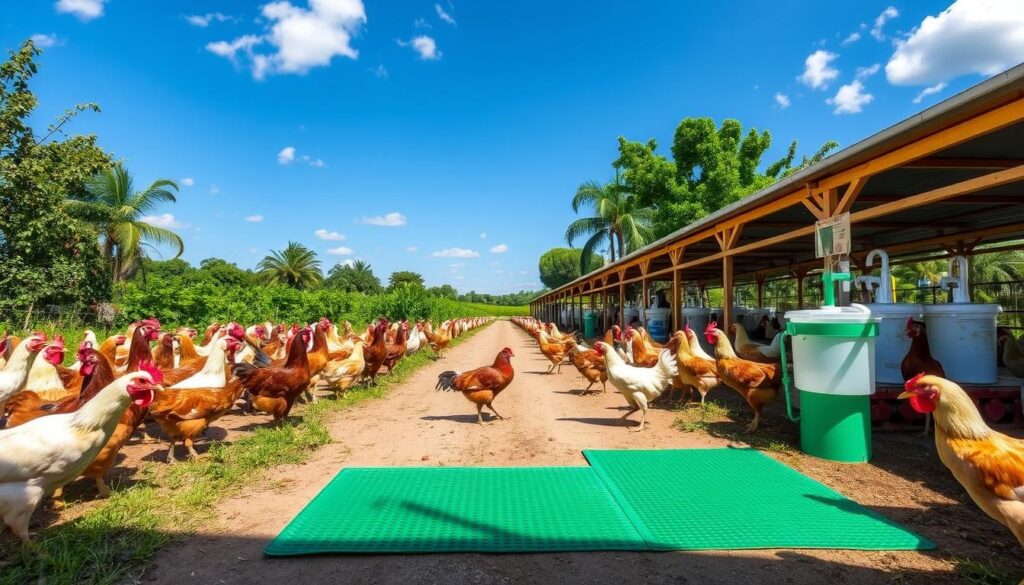
“Timely and coordinated action is essential in managing Newcastle disease outbreaks to safeguard the health and productivity of poultry operations.”
Vaccinations: A Key Defense Strategy
Keeping poultry healthy and productive is a big deal for any farm. Newcastle disease vaccination is a key part of this. It helps protect birds from a very contagious virus.
Vaccination Protocols and Schedules
Creating a detailed vaccination schedule is key to poultry health. Vaccines are given at different times to fit the birds’ needs. This helps keep them safe from disease.
The schedule depends on the birds’ type, age, and life stage. Birds get their first vaccine early, then boosters later to keep them safe. Following these vaccination protocols is vital for the birds’ health.
| Vaccination Stage | Recommended Timeline |
|---|---|
| Initial Vaccination | 4-7 days of age |
| First Booster | 14-21 days of age |
| Second Booster | 4-6 weeks of age |
| Subsequent Boosters | Every 4-6 months |
Following these vaccination protocols and schedules helps farmers keep their birds safe. It reduces the chance of disease outbreaks.
Newcastle Disease Management in Commercial Poultry
Managing Newcastle disease in big poultry farms is key to keeping birds healthy and productive. By using strong disease control plans, farms can lower the chance of outbreaks. This helps keep the birds safe and healthy.
At the heart of managing Newcastle disease are best practices and strict biosecurity steps. These include:
- Strict sanitation protocols for farm equipment, vehicles, and personnel
- Controlled access to poultry facilities to limit visitor and worker movement
- Proper disposal of dead birds and biosecure handling of litter and waste
- Regular disinfection of housing, feed, and water systems
Vaccination is a big part of controlling Newcastle disease in big poultry farms. Producers need to work with vets to create vaccine plans. These plans must fit the needs of each flock, like age and breed.
| Key Considerations for Newcastle Disease Vaccination in Commercial Poultry | Description |
|---|---|
| Vaccination Timing | Vaccine administration should be scheduled to provide optimal protection at the most vulnerable stages of the birds’ life cycle. |
| Vaccine Types | Producers may utilize a combination of live and inactivated vaccines to elicit a robust immune response. |
| Booster Schedules | Regular booster shots are often necessary to maintain long-term immunity and safeguard against Newcastle disease outbreaks. |
By following best practices, strong biosecurity, and detailed vaccine plans, big poultry farms can fight Newcastle disease. This ensures the health and productivity of their birds.
Newcastle Disease: A Viral Zoonosis
Newcastle disease is a highly contagious virus that worries public health experts. It can spread from birds to humans, leading to outbreaks. This makes it crucial to be careful and take steps to control the disease.
Public Health Implications
Newcastle disease mainly hits birds like chickens and turkeys. But it can also affect humans, though it’s rare. When it does, it might cause eye problems, flu-like symptoms, or even breathing issues.
The virus usually spreads to humans by touching infected birds or their fluids. This shows how important it is to protect both birds and people from this disease.
To stop Newcastle disease from spreading, we need to follow strict safety rules. Wearing protective gear and keeping clean are key. These steps help keep both birds and people safe.
“The zoonotic potential of Newcastle disease virus highlights the need for vigilance and collaborative efforts between the poultry industry, public health authorities, and the medical community to effectively manage and control this viral threat.”
Keeping an eye out for outbreaks and acting fast is vital. This way, we can limit the disease’s impact on both birds and humans. Working together, we can protect our communities and the poultry industry.
Newcastle disease is a big deal in the poultry world. It’s a viral infection that can harm many birds. This makes it crucial to manage it well.
We’ve looked into how Newcastle disease works and its effects on birds. Knowing the signs early and keeping farms clean are key to stopping it. This helps keep birds healthy and farms running smoothly.
Managing Newcastle disease requires teamwork. Poultry farmers, vets, and others must work together. By using new vaccines and keeping farms safe, we can protect birds. This keeps our food supply safe and helps the poultry business stay strong.
FAQ
What is Newcastle Disease?
Newcastle disease is a highly contagious viral infection that mainly affects poultry. It is caused by the Newcastle disease virus, an avian paramyxovirus. This virus can cause severe respiratory illness, nervous system disorders, and a drop in egg production in birds.
What are the common symptoms of Newcastle Disease?
Symptoms of Newcastle disease include respiratory issues like gasping, coughing, and sneezing. It also causes nervous system problems like tremors, drooping wings, and head and neck twisting. A big drop in egg production is another sign of the disease.
How is Newcastle Disease transmitted?
Newcastle disease spreads through direct contact with infected birds, contaminated equipment, and airborne transmission. Wild birds can also carry the virus. It’s important to have strict biosecurity measures to stop the disease from spreading in poultry operations.
How can Newcastle Disease be prevented and controlled?
To prevent and control Newcastle disease, a multi-faceted approach is needed. This includes strict biosecurity, vaccination programs, and effective outbreak response. Biosecurity measures like disinfection, restricted access, and proper disposal of infected birds are key. Vaccinations protect poultry flocks. Quick action in outbreaks, including culling and depopulation, helps contain the virus.
What is the public health significance of Newcastle Disease?
Newcastle disease is a viral zoonosis, meaning it can spread from animals to humans. While rare, human infections can happen through close contact with infected poultry or contaminated materials. It’s crucial to have proper biosecurity and disease control to reduce the risk of transmission between poultry and humans.


